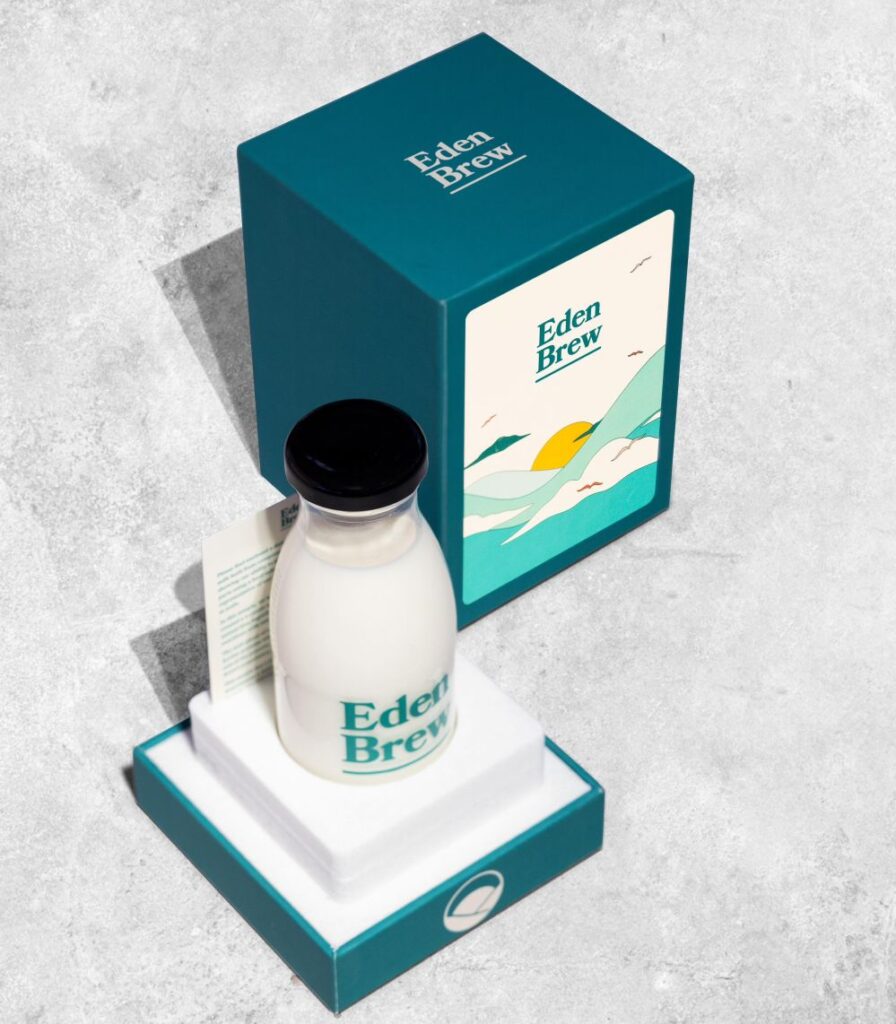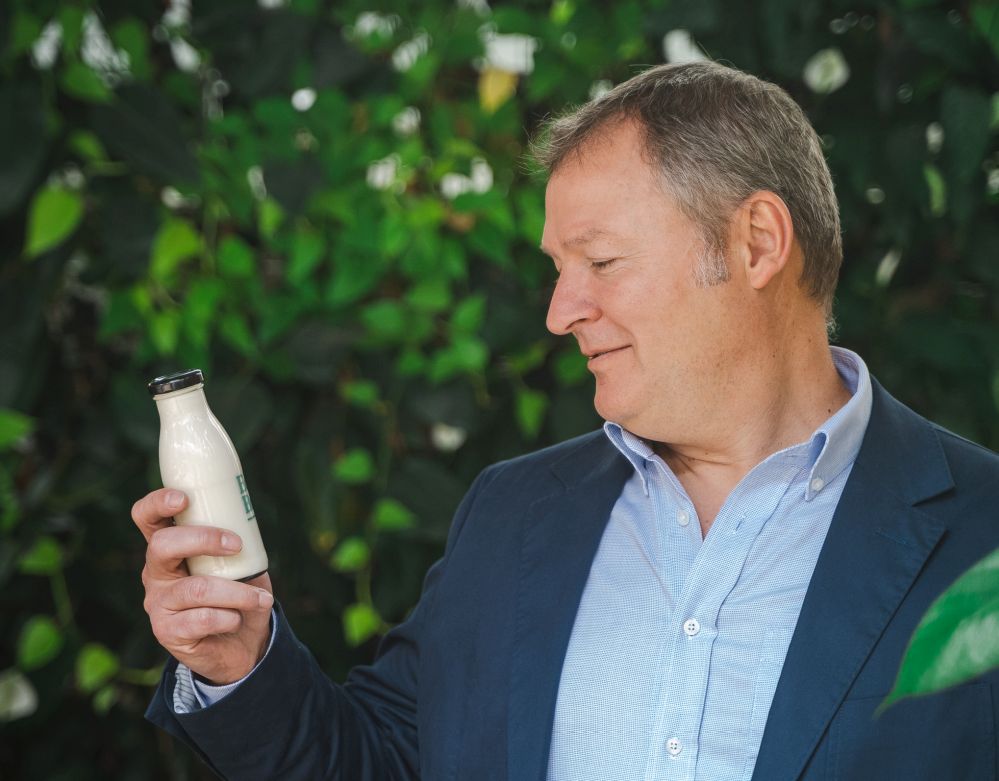Barely a month goes by without a new player entering the ‘animal-free’ dairy category, with a flurry of startups now producing whey and casein proteins via genetically engineered microbes or plants. But what will distinguish the winners from the losers in this nascent space?
Approaches vary, with some players (Remilk, Perfect Day) focusing on a B2B strategy and others (Change Foods, Nobell Foods) intent on building consumer brands.
Either way, says Sydney-based startup Eden Brew, firms with any hope of success will need ultra-efficient microbial strains or plants, a scalable production process, access to capital, regulatory savvy, and a clear route to market.
Created in 2020 by ex-Woolworths general manager Jim Fader, Australia’s biggest dairy co-op Norco, the national science agency CSIRO and investment partner Main Sequence, Eden Brew believes it ticks all of these boxes, although it’s under no illusions about the challenge ahead, Fader tells AgFunderNews.
A$24.4m series A
While many foodtech investors are cooling on the ‘alt protein’ space, Eden Brew has just raised a fairly sizable series A round (A$24.4 million/$15.4 million) led by Main Sequence Ventures.
“It took us probably six months longer than we were expecting,” says Fader. “And I’d say we won and also lost some investors based on our B2C strategy. But being able to articulate a reasonably mature commercial strategy coupled with the cofounder structure between CSIRO, Norco, and Main Sequence was definitely helpful.
“Our proven tech also made a difference, as we can combine all four [classes of] casein proteins into micelles [spherical structures enabling the proteins to remain in suspension], which is important from a sensory and functional perspective.”
The partnership with Norco
Under the partnership with Norco, Eden Brew will produce the four casein proteins individually via precision fermentation (using genetically engineered Pichia yeast strains) and ship the protein powders to Norco. Norco will then combine them and add water and a mineral complex that will trigger the formation of micelles under certain conditions defined by Eden Brew.
It will then add recombinant whey protein (beta-lactoglobulin, also produced by Eden Brew), a coconut-based fat complex, a nutrient complex and a flavor complex to create ‘milk,’ which will then go through a homogenizer and pasteurizer and into a fridge, explains Fader.
“Eden Brew will own the product and Norco will be doing toll manufacturing for us.”
Unit economics
And according to Fader, the numbers add up: “We’ve got good techno economics around what it’s going to cost us to produce these casein proteins, and the other costs are all well-known.
“When we launch in 2025, it will cost about A$4 to make one liter of milk and we’ll sell it for about A$5 into cafes, which currently buy oat- and almondmilk for $4.50 to $5. So we’re not out of step with the more expensive plant-based milks, although we will initially be more expensive than dairy milk from cows.
“From there, there are two main levers to get costs down,” he says. “One is increasing the scale of our fermentation and the other is getting better at it. We’re launching as soon as we can, but there is still room for process optimization, improvements in titer [the amount of casein relative to the volume of liquid]; productivity [how fast you can make casein with a given bioreactor volume]; and yield [the feed conversion rate].
“There’s also further work to do around best in class downstream processing, which will ultimately lead to a lower cost of goods,” says Fader. “So it’s going to be a journey from an initial $4 to make one liter in 2025 to $1.50 by the end of the 2020s. Two thirds of that reduction in cost will be from increasing scale and the rest from better brewing.”
Manufacturing and scale up
As for scaling up, Eden Brew is in discussions with multiple co-manufacturers, says Fader. “One has particular expertise in downstream processing and another [Cauldron] has got a very strong position around continuous fermentation [which could significantly reduce processing costs], but our technoeconomic projections are based on batch processing.”
The initial plan for the commercial launch in 2025 is to brew the casein proteins in 100,000-liter tanks, ultimately scaling to 500,000-liter tanks, he adds.
“Right now we’re brewing in 10-25 liter tanks, but this raise is all about taking us to commercial readiness, so we would expect to be doing brews in the number of tens of thousands of liters in 12 months’ time within this budget.
“We’re not naïve about the technical challenges of scaling to far bigger tanks, but we’ve got a really strong R&D network with lots of experience scaling Pichia [yeast] and lots of experience working in dairy science.”

The go to market strategy
As for the go-to-market strategy, he says, “We’re wedded to a B2C strategy [launching milk under the Eden Brew brand]. My background is in consumer product development and our COO and CFO Peter Fridell has a background in beverages and has run a large infant formula manufacturing company, Bellamy’s Organics in Australia.
“But I think the world needs both: ingredients suppliers enabling large businesses with existing brands to include animal-free dairy ingredients, but also new consumer brands like Eden Brew.”
Ideally Eden Brew would like to build a successful relationship with Norco in Australia, scale its fermentation capacity, and then strike similar relationships in other markets with other dairy companies, he says.
Regulatory and labeling
From a regulatory perspective, Eden Brew is preparing a novel foods application with Food Standards Australia and New Zealand (FSANZ), which in the best case scenario could be processed within around 12 months of submission, he says. “But if they’ve got questions, the clock stops, so it could take longer. We are also planning submissions in parallel in the US and Singapore.”
As for labeling and terminology for dairy products made without cows, which has generated some debate in the US, he says, “We need to be disciplined about how we do this, so we’re taking a consultative process with consumers to understand their reactions, propensity to buy, barriers to purchase and so on.
“Ideally there is a category approach, so you don’t have one company saying ‘animal-free dairy,’ another saying ‘whey protein from fermentation’ and another saying ‘brewed proteins.”
What is animal-free dairy?
There is no formal definition of ‘animal-free’ dairy—a term being tested by some startups in the space—but it typically refers to products made with ‘real’ dairy ingredients such as whey and casein proteins that are produced without cows, either via genetically engineered microbes or genetically engineered crops such as soybeans, corn, or peas.
Using synthetic biology, firms in this space use DNA sequences like pieces of computer code to program or instruct plants or organisms such as fungi and yeast to express animal proteins.
Making dairy products without cows, argue animal-free dairy advocates, offers the best of both worlds: more sustainable and ethical products that don’t involve industrialized animal agriculture, but still deliver the nutrition and functionality of ‘real’ dairy such as melty, stretchy cheese, which is hard to make with plant proteins.
California-based Perfect Day is the most advanced player in the field, producing whey protein from multiple sites that supply emerging CPG brands to large CPG companies including Mars (CO2COA) and Nestlé (Cowabunga), who are testing the waters with various products and concepts.
Other startups include Remilk and Imagindairy in Israel; Change Foods and New Culture in the US; All G Foods in Australia; Formo in Germany; Those Vegan Cowboys in Belgium; Daisy Lab in New Zealand and so-called ‘molecular farming’ players such as Nobell Foods (an AgFunder portfolio company), Pigmentum, IngredientWerks, Mozza, and Miruku.
Further reading:





